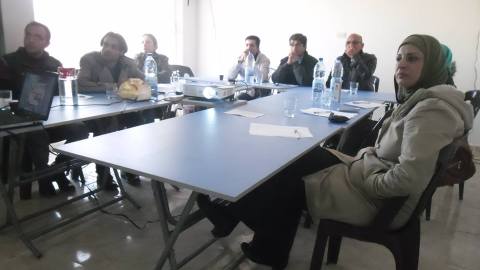To the activists behind the Mandela House initiative, citizenry, freedom, democracy, tolerance and peace must be more than simple words or slogans, rather a reality to be lived and experienced. Their proclaimed goal is to bring about a reworking of the civic consciousness of modern Syria, away from the sectarianism and tribalism of old, in an attempt to match the political uprising with one in the mind. This quest puts them at the forefront of the civic struggle for the future of Syria.
The Mandela House was launched in the northeastern city of Qamishli on October 10, 2014. The project was founded by three members of the Assyrian Democratic Organization: Oussama Ahmad, Rawzan Saado and Ghandi Saado. The idea for the initiative was born out of several collaborations between the activists on varied projects including: the First Spring Festival, Cinema Bus, Qamishli Peace Marathon. The initiative’s name, according to its founders, comes as both a homage to the great Nelson Mandela, and to draw inspiration from the values of forgiveness and reconciliation that he advanced.
According to one of the founding members, it was the need for an “incubator of sorts for young organizations and activist groups working in Qamishli by providing them with the necessary infrastructure and support.” The idea is that by providing such support, through workshops and training sessions, new projects will have a higher chance of success and will bring about a more sustainable development to the city of Qamishli and the Hasaka Governorate in general. This process, the founders hope, can also contribute to a more open dialogue between the various societal players in the area.
The founding values of forgiveness and reconciliation are pitted so as to counter the spread of unchecked violence across the country which is especially worrisome for the multi-ethnic and multi-religious area of al-Jazeera, in the northeast of Syria. The activists hope to contribute to “building social bridges between the different ethnic and religious communities by welcoming the various grassroots movements and giving them a shared place from which they can organize and coordinate their efforts.”
Mandela House’s first initiative will be to train around “200 activists from the Hasaka Governorate” in workshops ranging from media to transitional justice and psychological support for children. The training will happen in two phases and will be spread geographically around the governorate. The first phase will include: Qamishli, Amuda, Derbasiah and Ras al-Ayn. The second phase will focus on: Hasaka, Qahtaniyah, Jawadiyah and Derek. The training will also include a final graduation project at the end of each workshop, and the best of these projects will receive support from the organization to aid in its implementation.
The group’s activities also include a monthly film and book club. Books and films are chosen with relation to issues of civil strife and the consequences of dictatorships and civil wars. The first two to be discussed were: “Goodbye Lenin”, a German film about the aftermath of collapse of the Berlin Wall, and “On Identity”, a book by Lebanese-French author Amin Maalouf. The initiative aims to open a discussion on the book, which will be initially distributed to thirty people, and focus on both areas of agreement as well as disagreement. This will help, according to the group, to “come to concrete conclusions after the discussion on the strengths and weaknesses of nonviolent activism.” This project will also be supported by independent activists and the Pêl - Civil Waves foundation.
Mandela House, as conceptualized by its founders, hopes to be a meeting ground for the different shades of Syrians. “Despite the many difficulties and narrow margins of our work, we’ve decided to keep pushing our message,” says one of the founders, “and our strength is in our survival.”




